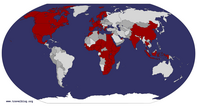With thanks to the Expat Aid Worker and John Ashworth who forwarded this to me.
BEGIN
February 16, 2011
by Shotgun Shack
Expat Aid Worker practitioners love feeling like they are supporting
locally-led development processes. They love being one with the people
and steering them towards self-sufficiency. They love building
capacity in local and national institutions and mainstreaming core
development principles like gender, human rights, sustainability,
participation, and local ownership during life-saving meetings in
communities, hotels, and retreat centers around the world.
They envision themselves as catalysts, animating people to travel down the long road to development; as facilitators, helping things along by their mere presence, asking the right questions at the right time and
then allowing things to naturally flow towards what local people want
to discuss.
After repeated attempts at facilitation, however, even the most noble Expat Aid Workers realize that if they want to succeed at their job, rather than facilitatation, they need to learn the gentle art of
facipulation: a delicate blend of facilitation (catalyzing, easing and
supporting conversations and actions around themes and issues
important to the community and/or program participants) and
manipulation (steering conversations towards their INGO’s established
themes and goals, and ensuring that actions and decisions made by
local people support their INGO’s interests and happen within the time
frame stipulated by their donors).
We’ve listed a few of our favorite workshop facipulation techniques here:
The workshop set-up. When selecting facipulants for the workshop,
choose those that you know from previous experience
a) agree with you,
b) understand what your agency wants to achieve and
c) have a stake in a future project that they don’t want to lose out on by being difficult.
It’s helpful if facipulants appear to represent a diverse
group, but that their diversity does not include diversity of opinion.
It’s also a good idea to decide on the core learning objectives or
meeting outputs ahead of time, and print them nicely in color on A-4
or a 3-fold brochure. The more official things look, the less likely
people will be to think they can change them.
Paying a per diem. This small token of appreciation (along with
providing a very healthy-sized breakfast, lunch, two full snacks, a
lot of soda, a cap, a t-shirt, a pen, a notebook, a nice workshop themed bag and other bits of swag) for facipulants helps them to help you steer the meeting where you want it to go. They must, of course,
want to be asked back to the next meeting.
Group work. Assign people to groups ahead of time, and plant someone
who knows exactly what you want to achieve in each group. Meet with
your plants ahead of time, make them feel special, and explain that
they are the ones you’ve chosen to help you help the groups move
forward. Engineer the group work exercises carefully so that you get
the answers that you are looking for, and never give sufficient time
to complete discussions.
Selective hearing. In plenary and group feedback time, use the
“there’s just so much participation going on I can’t capture it all!”
trick to ignore or skip over what you don’t want to deal with or what
doesn’t fit with where you need the workshop to go. After a few
ignores, most people will give up and start grumbling, but that makes
them look bad, not you. When this happens, give a pep talk about how
important everyone’s participation is, admonish the group for not
participating, ask if they are tired, and have the day’s volunteer
animator lead an embarrassing (singing/dancing) ice breaker to
motivate them.
Translation. Notify your translator ahead of time what your objectives
are for the workshop (this works for facipulating evaluations or
community visits with head office and donor delegations too), and he
or she will easily transform even the most challenging local language
response into just what you are looking for without you even realizing
it.
The “parking lot”. This helps ensure that your workshop stays on your
track, rather than veering off topic to discussions of things you or
your agency are not interested in or prepared for. When thorny issues
that require long-term, structural changes in the way your
organization works or how it interacts with the local community,
partner or government come up, simply say “Yes agreed. That’s a very
important point. But that’s not what we are here to discuss today.
Should we put that in the parking lot?” Then either a) get more
funding for another workshop to discuss it later (great tactic if you
are a consultant who wishes to extend a contract), b) task a small
group of people (excluding yourself) to deal with it on their own time
(they won’t), or c) put it in the “action plan” in your report (you
can be confident no one will ever follow-up on it). Once you move
issues to the “parking lot” you can get back to what you’re really there to do: move forward on your agency’s objectives.
Facipulation. A core competency in any successful Expat Aid Worker.
END
______________________


